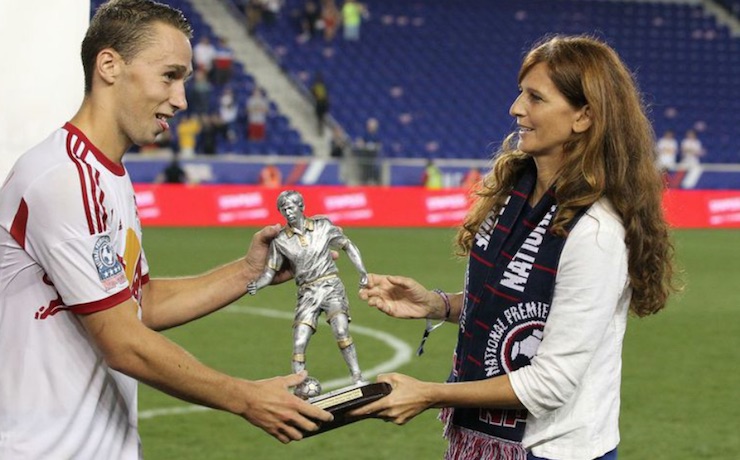SoccerToday’s Women in Soccer Series
From Wall Street to Men’s Soccer, NPSL’s Cindy Spera on what it takes to succeed as a woman in the world of soccer in America.
With a strong financial background, Cindy Spera combines her love for soccer with her education and rises to the top in a world dominated by men. Spera went from Treasurer for the National Premier Soccer League (NPSL) to now League Director. She is also the Governor of Social Activities for the New York Athletic Club and one of the very few women to be on not just one, but two board of directors. Spera is a successful women in the highly competitive soccer world and making a difference in American Men’s Soccer.
NPSL Chairman Joe Barone says, “Cindy is a visionary and a top-notch administrator. A former elite player with a great understanding of the game of soccer, we are very fortunate to have Cindy as our Director of Operation at the NPSL. Cindy’s dedication to building the league is extraordinary.”
SoccerToday spoke with Cindy Spera about her personal soccer experience, her goals as for the NPSL and her thoughts on American youth soccer:

Diane Scavuzzo: How does it feel to work in a male dominated world?
Cindy Spera: Working on Wall Street and learning to speak up and challenge was a great training ground for soccer. The environment of soccer is no different and I am conferrable with working men. I believe strongly in the NPSL and want to see it grow. Our mission is “To grow the sport of soccer in the United States of America; by providing our members with a sustainable business model and professionally managed soccer platform to serve as an inspiration to players and soccer fans in our members’ communities.”
Diane Scavuzzo: What advice would you give to women looking to have a career in soccer?
Cindy Spera: Relationships are key. You can only succeed if you have trust based relationships with the people you interactive with. Your knowledge and skill set will also be your strengths.
If you plan on being a part of men’s soccer, be aware and understand there have completely different dynamics from women’s soccer. It will make the transition easier if you are educated and aware of what you are diving into.
Diane Scavuzzo: Where did you work in finance and how was your transition into the male dominated world of men’s soccer?
Cindy Spera: I worked at Morgan Stanley from 1997 to 2013 and was COO for Morgan Stanley Global Operations for the last three years. I was responsible for the $1.8 Billion annual budget for all aspects of Operations. Before that, I was with Chase Manhattan Bank in the Real Estate Portfolio Group. Through my entire career, I’ve lived my life in a men’s world. It is what I am familiar with. I played women’s soccer but my time as a business person has always been in a male dominated environment.
Diane Scavuzzo: When did you first become involved with soccer?
Cindy Spera: My mother was lamenting to our neighbor Marie (who had two young boys slightly older than me) about how it was exhausting chasing me around the house and yard, how I refused to take a nap, and had more energy than any other child in my class. Marie advised her to put me is soccer! She sent her boys to soccer practice and they came home exhausted – and manageable… I was 6 only years old at the time. The rest is history!
Diane Scavuzzo: Where did you train as a youth soccer player?
Cindy Spera: My entire youth was with the Cow Harbor Soccer Club of the LIJSL (Long Island Junior Soccer League) based out of Northport NY.
In those days, kids generally stayed with one club that was in their home town, and parents did the coaching. I remember playing youth soccer with the same group of girls and against the same teams – which also had local players from their town – and it was very competitive despite the lack of recruiting and pulling players from other towns to create elite teams.
Diane Scavuzzo: Did you play soccer in college?
Cindy Spera: I attended Cornell University ’92. I started as an outside midfielder as a freshman and my coach – Randy May – turned me into a forward the following year. I loved playing up top.
Diane Scavuzzo: What National Competitions did you compete in?
Cindy Spera: My first National Championship was with the Long Island Rough Riders, the Lady Riders in 1995. I believe this was the first ever W-League national championship, as 1994 was a pilot year for the league. In that year, turning back the clock to ’95, the men’s Rough Rider team also won the national championship, which enhanced the experience even further as both teams socialized often and it was great to share the experience.
The Women’s team won the W League championship again in 1997. After leaving the Lady Riders in 2001, I became involved with the New York Athletic Club. We won the 2007 USASA Amateur Cup. Shortly after, I retired from the team and began managing the program for the Club. The team repeated the Amateur championship in 2010, and is currently the reigning national champion of the USASA Open Cup, winning in 2014.
Diane Scavuzzo: If you could have a Super Power, what would you like to have and why?
Cindy Spera: I would want to fly so I could take off and see the world!

Diane Scavuzzo: Let’s talk about youth soccer for a moment – what is the biggest problem with youth player development in the USA?
Cindy Spera: We are losing talented, gifted players with huge potential because of the pressure they feel from parents and coaches to be “The Best”.
This problem dilutes the USA talent pool and removes players from the game that could be future high level college, pro, or national team players. If kids do not enjoy playing and it’s not fun for them, even if their parents and coaches compel them to stay with the sport for a period of time, eventually these players will make their own decisions to leave the sport.
I have parents and coaches tell me all the time about how serious their child is about soccer, how they want to get a scholarship, and ask me how their child should train, and how to make them better. Then I ask and find out the child is 5, 6, 7 years old. This happens all the time! At that age, the only focus should be to get lots of touches on the ball and to have a fun, enjoyable experience with the sport. Once a young player is not having fun, they will eventually leave the sport and all the parenting and coaxing in the world will not get them back.
Diane Scavuzzo: What do you think about the Women’s World Cup being played on artificial turf?
Cindy Spera: I will always prefer a high quality grass field over turf. I understand that its expensive to maintain and I would rather see women playing on a quality field in a great venue than a lower quality grass field.
Diane Scavuzzo: How is your new position as Governor of Social Activities going with the New York Athletic Club?
Cindy Spera: It was difficult having to give up managing the NYAC’s soccer program, but it is going great.
Fun Fact:
Cindy Spera was named Ivy League Rookie of the Year (1988) and All-Ivy League First Team (1991) while playing women’s soccer at Cornell University. She went on to play for the Long Island Rough Riders from 1994 through 2001, claiming two national championships in 1995 and 1997. Spera would gather two more national championships with New York Athletic Club in 2007 and 2010. She currently serves as the Chairman of Soccer Programs for New York Athletic Club.
Spera is also an Executive Board Member for NPSL, and was on the board of the Cosmopolitan Soccer League Board from 2010 to 2014 (resigned for 2015 season). She also served on general board and as league auditor. In addition, Spera has worked with the United States Adult Soccer League – National Women’s Cup Committee – 2014 / 2015 and served as the Women’s Premier Soccer League (WPSL) Northeast Region commissioner 2014 / 2015.






